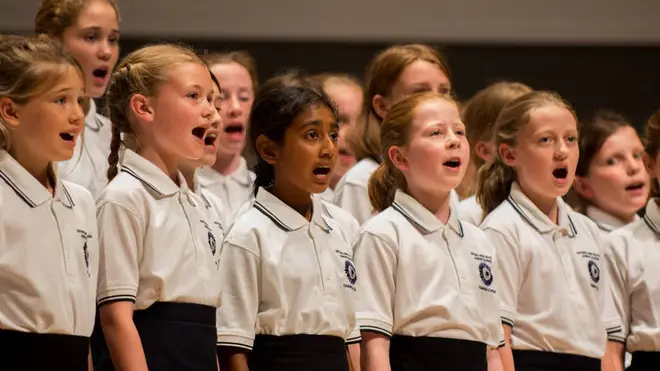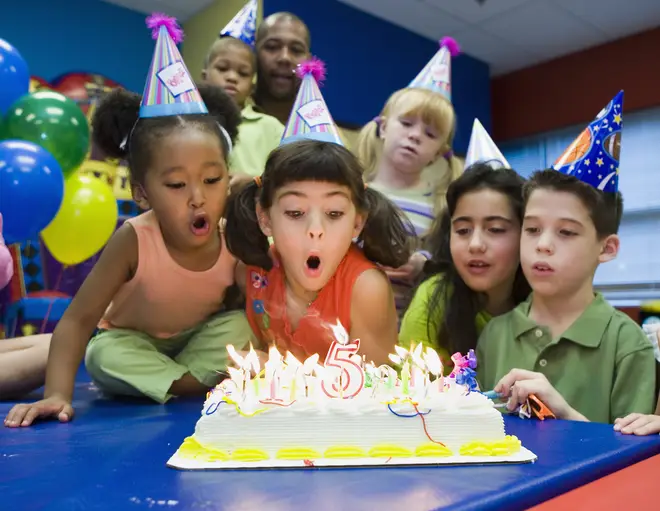Schools ban children from singing ‘Happy Birthday’ amid coronavirus fears
13 October 2020, 11:03 | Updated: 13 October 2020, 11:13

Some schools in England have reportedly banned singing in the classroom due to fears it could accelerate the spread of coronavirus.
Children in some schools in England are being told not to sing ‘Happy Birthday’ to their classmates, over fears their vocalisations could accelerate the spread of COVID-19.
Some schools are reportedly telling pupils to listen to the song online or hum the tune instead. Others are also said to be discouraging children from bringing in birthday cakes from home to reduce contact points for the virus.
Parent campaign group UsForThem said the ban has been self-imposed by certain schools. The group’s chair and mother-of-two, Christine Brett, told the Daily Mail that a ban on singing could be detrimental to children’s wellbeing, and they should be able to return to a “normal and support environment”.
“Singing represents a low risk in terms of transmission from children, who are the lowest risk of both getting and transmitting this virus,” she said.
“Birthdays only happen once a year and it’s a day when a child feels special. Now their classmates are banned from singing to them, they are not allowed to bring in sweets or cake to share and due to the rule of six, many are unable to have a party outside school.
“We cannot put their young lives on hold forever,” she added.
The Department of Education said it is up to individual schools to decide whether children can sing in classrooms.
Read more: What are the new rules for rehearsals, concerts and live music venues? >

Singing, despite scientific testing that showed it is no riskier than talking, is still perceived as higher risk than other forms of music-making due to the emission of increased quantities of aerosols – tiny particles of moisture produced through breathing and speaking.
In a poorly ventilated space filled with people, like a closed classroom, the particles can remain in the air for several hours.
Yesterday (12 October), the government’s deputy chief medical officer Prof Jonathan Van-Tam said scientists “have increasingly strong evidence that shouting and singing [make] the expulsion of virus-laden particles go further and the transmission become more intense”.
Official government guidelines on music-making in schools state that singing in schools can still take place, but extra measures should be taken. “Playing instruments and singing in groups should take place outdoors wherever possible. If indoors, consider limiting the numbers in relation to the space,” the guidance states.
“Singing, wind and brass playing should not take place in larger groups such as choirs and ensembles, or assemblies unless significant space, natural airflow (at least 10l/s/person for all present, including audiences) and strict social distancing and mitigation as described below can be maintained.”
Singing has also been banned in pubs, with landlords being told to take “all reasonable measures” to stop singing on the premises. There has been great frustration from music sector workers around the ongoing restrictions on live performance, as many professional singers and other performers have not worked since March.

"Increasing evidence" shouting and singing increases coronavirus transmission
Read more: Government scraps controversial ad suggesting ballet dancers ‘rethink’ and ‘reskill’ >
Going back to school has been far from normal for many children across England. Despite ‘enhanced cleaning procedures’ and staggered start times, children and teachers have still been testing positive for coronavirus.
And with the rule of gathering in age group ‘bubbles’, if one child tests positive, often an entire year group is sent home to reduce the spread.
According to the Office for National Statistics, in a study of more than 55,000 coronavirus patients in hospitals, less than one percent were under the age of 19. The UK’s chief medical adviser, Prof Chris Whitty, said in September that “the chances of children dying from Covid-19 are incredibly small”.


































